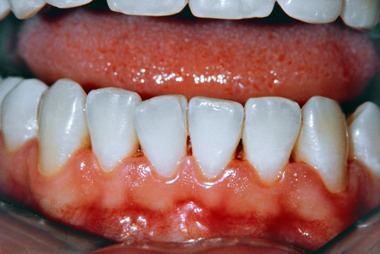What is gum disease

Gum disease (periodontitis/periodontal disease) is a condition that affects the gums, bone and other supporting tissues of the teeth. Gum disease is preventable and can be successfully treated when detected early enough.
The condition is not usually painful, so you may not be aware of it until your dental professional checks for it.
The early stage of gum disease is known as gingivitis. If you have gingivitis, your gums may bleed when you brush your teeth, and you may have bad breath. Gingivitis can be reversed by effective cleaning of the teeth and gums.
If gingivitis is not controlled, gum disease can develop. This results in loss of the bone which supports the teeth. It can lead to tooth movement and wider gaps between teeth. Teeth can become loose and eventually fall out.
What causes gum disease
Gum disease is caused by bacteria that collects at the gum line in a sticky substance known as dental plaque.
Dental plaque needs to be removed by brushing and cleaning around and in between teeth twice a day. If not properly cleaned, the gum starts to come away from the tooth, forming a pocket. The plaque then grows down below the gum line. Over time, the bone that supports the teeth is destroyed, the gums shrink and eventually the teeth become wobbly and then they may fall out.
Some people are at a higher risk of developing gum disease. This includes people:
- whose parents have had gum disease
- who have diabetes
- who smoke (or possibly use e-cigarettes)
- who are stressed
- who have a poor diet
- who are obese
- who have certain medical conditions
What can I do to prevent gum disease
To prevent gum disease:
- Brush your teeth for 2 minutes twice a day
- Clean in between the teeth with floss or interdental brushes once a day
- If you are a smoker, quit
Get help to quit smoking by calling 0800 085 2219 or visiting www.helpmequit.wales
If you have diabetes, controlling this well will also help to control gum disease. Speak to your GP.
See a dental professional for check-ups as regularly as they recommend.
Bleeding gums are a sign of gum disease. If your gums bleed when you brush your teeth, call your dental practice for advice.
How is gum disease treated?
Treatment for gum disease aims to reduce the levels of bacteria around your teeth and to stop the condition from getting any worse.
Your dentist can teach you the best ways to keep your teeth and gums clean. For treatment of gum disease to be successful, you must maintain a good level of oral hygiene by brushing around and in between your teeth twice a day. Use floss or interdental brushes to clean between your teeth.
Treatment may involve professional cleaning of the teeth by a dental professional, such as a dentist, therapist or hygienist.
The British Society of Periodontology has lots of useful information on gum disease for patients.
Acute necrotising ulcerative gingivitis (ANUG)
In rare cases, a condition called acute necrotising ulcerative gingivitis (ANUG) can develop. ANUG is more common in smokers.
Symptoms of ANUG are more severe than gum disease and include:
- bleeding, painful gums
- painful ulcers
- receding gums in between your teeth
- bad breath
- metallic taste in your mouth
- excess saliva
- difficulty swallowing or talking
- a high temperature (fever)
As well as the oral hygiene advice given above, ANUG may require painkillers. For pain relief try Paracetamol or Ibuprofen (follow dosage instructions on the packet).
There’s a new way to register your interest for a place at an NHS dentist. The Dental Access Portal will provide a central platform for Health Boards to allocate places for routine dental treatment at NHS dental practices across Wales.
If you need urgent dental care, contact your local NHS dental helpline.